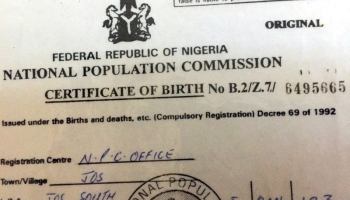A birth certificate is an official document given to an individual born in Nigeria. A birth certificate is issued by the National Population Commission (NPC), which is responsible for registering every person born in Nigeria.
The NPC has different registration centres located in various states in Nigeria, with centres at Local government Headquarters, hospitals, health centres’ etc. The National Population Commission is currently the only organization authorized by the government to issue birth documents in Nigeria. Birth certificates issues in churches or mosques are not recognized officially.
How to Get a Birth Certificate in Nigeria

A birth certificate is very important as it is accepted and recognized for official purposes and other applications in Nigeria, such as higher institution registration, government applications, international passport application, etc. There are different procedures involved in getting a birth certificate in Nigeria depending on the place of birth and the timing.
Procedure for Obtaining Birth Certificate in Nigeria
The NPC Act states that Nigerians and foreigners born before 1992 will not be issued a birth certificate but an Attestation of Birth Certificate from the NPC. Birth certificate will be issued only to persons born in Nigeria after 1992.
Such an applicant is required to pick up a form from the office of the National Population Commission. This form is known as form B and is expected to be filled by the applicant or the parents of the applicant.
The form with other relevant documents will be submitted back to the National Population Commission for verification and processing. The verification processes involved in obtaining a birth certificate takes only a few days.
The procedures for getting a birth certificate differ according to situations
For example, the procedures of obtaining a birth certificate for a person born in the hospital or any other medical institution are different from the procedures for a person born outside of a medical institution.
The procedure also differs based on timing that is the process of obtaining one’s birth certificate months or years after one’s birth is different from how it is gotten within 60 days after birth.
Below are the various procedures on how to get a birth certificate in Nigeria.
How to obtain a birth certificate for a child born in the hospital or other medical institution in Nigeria
After the birth of a child in a medical institution such as a hospital, the institution will issue a certificate to the child as proof of the birth. The birth report issued at the hospital is expected to be taken to any of the National Population Commission registration centres’ located in hospitals or at the local government headquarters. At the registration office, you will submit the proof of the birth issued by the hospital or health centre. A birth certificate or certificate of registration will then be issued for the child.
Note that the initial certificate issued as proof of birth at the hospital is not valid. You must ensure you obtain the authentic birth certificate at the registration centre of the National Population Commission.
How to obtain a birth certificate for a child born outside the hospital
Below are the steps to be taken, in a case where a child is not born in a medical centre or establishment but at home, church or any other place outside the hospital, health centre or medical establishment:
Go to the Local Government Authority where the child was born to obtain an affidavit. An Affidavit is the name of a document that contains a sworn statement which is made under oath and affirmed before an authorized officer of the court. This affidavit will serve as proof of birth. You will then take the affidavit as proof of the birth to any registration centre of the National Population Commission at the local government headquarters or any health centre
Submit the affidavit to the registration officer. A birth certificate or certificate of registration will then issued for the child.
How to obtain a birth certificate for a person under the age of 18
This applies to someone who was not issued a birth certificate at birth or for someone whose birth certificate is misplaced. In some cases, it is also applicable for someone who has undergone a change of name. The National Population Commission is the agency responsible for issuing of birth certificate to anyone under the age of eighteen. Below are the steps to be taken:
Obtain an Age Declaration Affidavit from a court
Go to the National Population Commission located in the State Local Government Secretariat and get a form which you will fill as your birth certificate
The presence of a parent is required before an Age Declaration Affidavit can be issued to a person under the age of 18.
The Age Declaration Affidavit should be submitted at the National Population Commission office and then a birth certificate will be issued.
How to get a birth certificate in Nigeria for a person above the age of 18
For people who are above the age of 18, only an attestation letter is given by the National Population Commission. The attestation letter is issued as a back up to the sworn Age Declaration Affidavit and this serves as proof of age
Requirements and Procedures for an Adult to Obtain a Birth Certificate from Outside of Nigeria
The requirements for an adult to obtain a birth certificate from outside of Nigeria are quite similar to applying from inside Nigeria.
Applicant resident outside Nigeria is required to submit their passport photographs through a representative who will then provide all necessary information such as their date of birth, place of birth, state of origin, local government area, and the tribe of the applicant to the local government where the application is being processed.
An adult can also obtain a sworn affidavit instead of a birth certificate
A legally authorized agent is allowed to act on behalf of the applicant. The proxy can apply for and pick up a birth certificate on behalf of the applicant.